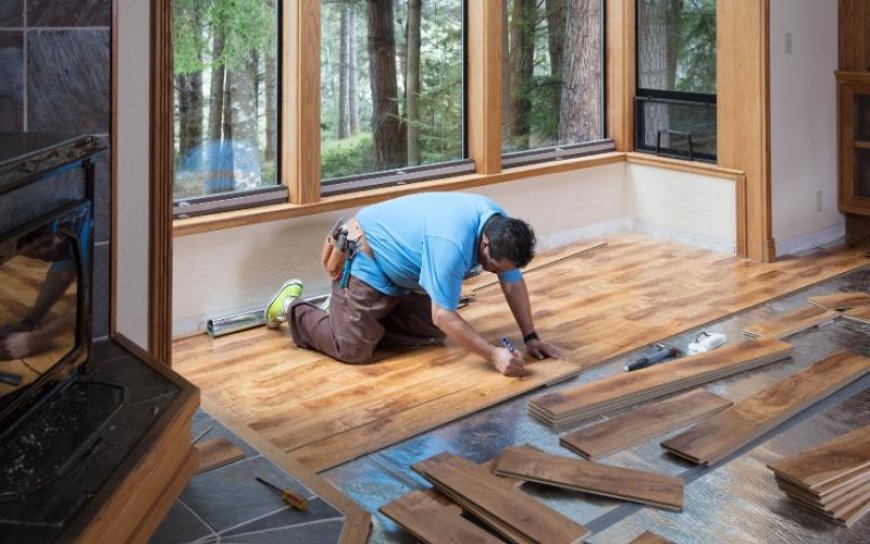Should You Stay or Leave During a Hardwood Floor Installation?

If you’re planning a hardwood floor installation, you might be wondering, “Do I need to move out during the process?” It’s a common question—and for good reason. Installing new floors can be messy, noisy, and disruptive to your daily routine. But the answer isn’t always a simple yes or no.
Whether or not you need to move out depends on a few key factors, like the size of the project, the type of flooring, and your personal comfort level. Let’s break it down so you can make the best decision for your situation.
What Happens During Hardwood Floor Installation?
Before we dive into whether or not you should move out, it’s helpful to understand what’s involved in hardwood floor installation. The process typically includes:
- Preparation: Removing furniture, old flooring, and prepping the subfloor.
- Installation: Laying down the hardwood planks, nailing, gluing, or floating them in place.
- Finishing: Sanding, staining, or applying a protective sealant, if needed.
Depending on the scope of your project, this can take anywhere from a few days to a week (or longer for larger homes).
Factors to Consider
1. The Scope of the Project
If you’re only replacing the floors in one room, staying in your home is usually manageable. You can move furniture to another room and avoid the construction area.
However, if the installation involves multiple rooms or your entire home, it may be more practical to stay elsewhere. The noise, dust, and limited access to rooms can quickly become overwhelming.
2. The Type of Hardwood Flooring
Prefinished hardwood flooring is quicker to install because it doesn’t require sanding or sealing on-site. In many cases, you can walk on it the same day it’s installed.
On the other hand, unfinished hardwood flooring requires additional steps, like sanding, staining, and sealing, which can produce strong odors and dust. If you’re sensitive to smells or have allergies, leaving during this stage might be a good idea.
3. Air Quality and Dust
Sanding and finishing hardwood floors can release fine dust particles into the air, even with proper equipment. While professional installers will take steps to minimize dust, it’s nearly impossible to eliminate it completely.
If you or someone in your household has asthma, allergies, or other respiratory issues, moving out temporarily can protect your health.
4. Noise Levels
Installing new floors isn’t exactly a quiet process. Between removing old flooring, cutting planks, and nailing or stapling them into place, it can get pretty noisy. If you work from home or have young children or pets, the noise might be too disruptive to manage while staying in the house.
When It’s Best to Move Out
Here are a few scenarios where moving out might be the better choice:
- You’re getting floors installed in multiple rooms or the entire house.
- The project involves sanding, staining, or sealing, which can produce odors and dust.
- You have young children, pets, or anyone in your household with respiratory issues.
- The work schedule conflicts with your daily routine, making it hard to live comfortably during the project.
Tips for Staying in Your Home
If you decide to stay during the hardwood floor installation, here are a few tips to make the process easier:
- Seal Off Work Areas: Ask your installer to use plastic sheeting or barriers to contain dust and debris.
- Plan Around the Schedule: Coordinate with your contractor to avoid being home during the noisiest phases.
- Create a Safe Space: Designate a room or area that’s unaffected by the work where you can relax and keep essential items.
- Protect Pets: Keep pets in a secure area away from the work zone, or consider boarding them temporarily.
Should You Stay or Go?
Ultimately, deciding whether to move out during a hardwood floor installation comes down to your personal preferences and circumstances. If the project is small and you’re okay with some noise and disruption, staying put might work just fine.
However, if the installation involves your entire home or includes sanding and finishing, moving out temporarily can save you a lot of stress. Talk to your hardwood flooring contractor in Portland, ME about the timeline, potential challenges, and what to expect so you can make an informed decision.
No matter what you choose, the end result will be worth it—a beautiful, long-lasting hardwood floor that adds value and warmth to your home!
